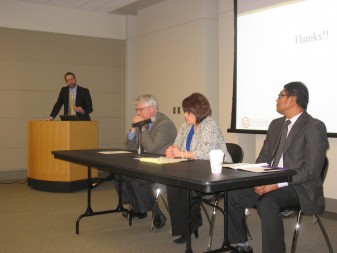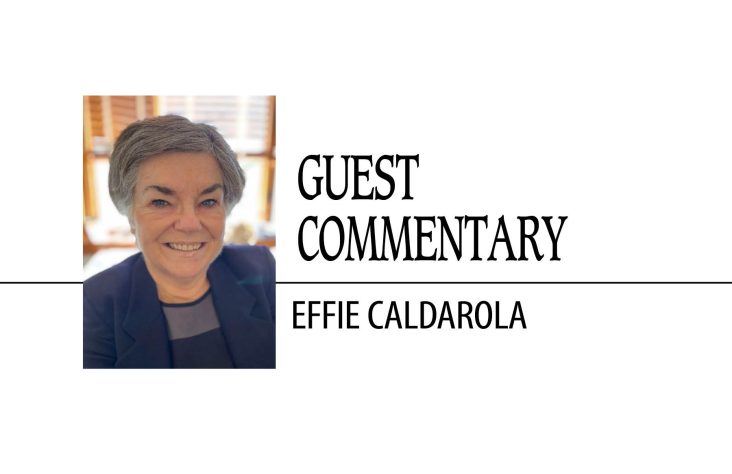December 9, 2015 // Uncategorized
Hesburgh Lecture Series focuses on ‘Fighting for those in Need’

At the seventh annual Hesburgh Lecture Series in Fort Wayne, Jacob Benedict, far left, served as moderator for a panel discussion on those in need. Panelists included, from left, Dr. Bill Evans, Gloria Whitcraft and Nyein Chan.
By Vince LaBarbera
FORT WAYNE — The Notre Dame Club of Fort Wayne and Catholic Charities, Diocese of Fort Wayne-South Bend, in conjunction with the Alumni Association of the University of Notre Dame, hosted a lecture followed by a panel discussion focusing on current research and programs aimed at helping those in need.
The event, which was free and open to the public, was held Dec. 2 at the Allen County Main Library downtown. It offered an opportunity to learn about leading research programs focused on finding solutions to the challenges and work that goes on locally to help neighbors in need. Attendees were able to interact with panel members during a question-answer session.
Panelists included William N. Evans, Ph.D., Keough-Hesburgh professor of economics at the University of Notre Dame; Gloria Whitcraft, chief executive officer for Catholic Charities; and Nyein Chan, refugee services director at Catholic Charities.
Professor Evans initially spoke about the three-year-old Wilson Sheehan Lab for economic opportunities at Notre Dame. Known as the Lab for Economic Opportunities (LEO) — named after Pope Leo XIII who wrote the initial encyclical on Catholic social teaching — current research initiatives include women’s and children’s nutrition, homelessness prevention, job readiness, youth engagement and poverty alleviation.
Catholic Charities in Fort Wayne has programs for pregnancy services, poverty relief, food support, refugee resettlement, immigration and aging.
In his opening remarks, Dr. Evans said there are two ways social service organizations deal with poverty: charities provide for the needs, just as they have for the past 100 years, treating the symptoms of poverty. Or, by reorienting focus, spend more money to move people out of poverty instead of just dealing with the current situation they are in.
“You have to know what works and what doesn’t work,” he emphasized, “and take evaluation more seriously, collecting the necessary data.”
Professor Evans said LEO’s initial goal was to generate academic quality research-driven poverty solutions. “The phrase we like to use is that we innovate, evaluate, disseminate and replicate. At the local level there are a lot of good ideas on how to move people out of poverty,” he continued. “To figure out which ones are worth investing in and which are not you have to evaluate. Once you evaluate and close down ineffective programs you have to invest in those that are working. And the way you do that is disseminate information… After that we want the successful programs to be replicated.”
Before moving into the panel discussion, Dr. Evans gave examples of several successful programs across the county with which LEO is working.
Questions from moderator Jacob D. Benedict, director of research for AMI Investment Management, Kendallville, and the audience began with how donors should go about evaluating where to put their money.
“In this day and age, everything’s on the web,” Dr. Evans said. “The big problem is just separating how much information there is.” The sad aspect is if you had an interest in the homeless, special needs kids or single moms, for example, there’s a lot of agencies out there. Separating who is going to provide something and be a good steward of your resources in a way that’s consistent with your beliefs is difficult. The website LEO.nd.edu is publishing some results of its evaluations, he said.
Whitcraft added that Charity Navigator and Guidestar were good web resources. She also encouraged inquirers to check if an agency is accredited and its rating with the Better Business Bureau.
“These things should be listed on an agency’s website,” she emphasized. “And agencies should be transparent. If you want to talk with the CEO or the development person you should be able to and they should be willing to answer donor-related questions, and if not, that could be a red flag.”
With regard to refugee resettlement, Chan said one challenge is the government establishes a time frame of a 90-day resettlement process, during which Catholic Charities provides “core services,” — how to find a job, enter their kids in an after-school program, get good nutrition, learn how to be an American citizen and integration into society.
Responding to the question, “Do the homeless shelters try to educate their clients so that they can stop the cycle of homelessness,” Whitcraft cited several local agencies with which Catholic Charities exchanges referrals and works collaboratively in an effort to serve the poor and vulnerable holistically.
Benedict concluded the question-answer by asking how each panel member would use $50,000 if an investor gave that amount of money to each of them.
“We certainly would spend some of those funds on evaluation,” said Whitcraft, “because we want to be good stewards of our dollars. And I would like to see our agency do more preventative work,” she added.
“I would like to do what Gloria says,” joked Chan, since he works for her. He added that based on his own experience, he would like to offer an extended case management program to newly arrived refugees, after the 90-day timeframe provided for immediate resettlement services, to help the newly arrived refugee acclimate as well as possible.
The best news. Delivered to your inbox.
Subscribe to our mailing list today.






